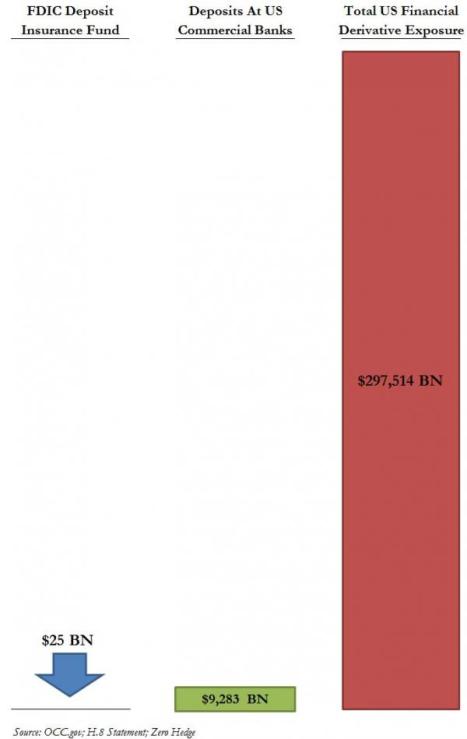
The problem with deriviatives is graphically
illustrated in this chart from a March 2013 ZeroHedge post
pictured above:
After closing their New World Order meeting in China and wearing their stupid costumes on the weekend of November 16th, the
G20 New World Order leaders whisked into Brisbane, posed for their photo ops, approved some
proposals, made a show of roundly disapproving of Russian President Vladimir
Putin, and whisked out again. It was all so fast, but they knew they were endorsing and rubber-stamping the Financial Stability Board’s
“Adequacy of Loss-Absorbing Capacity of Global Systemically Important Banks in
Resolution,” which completely changes the rules of banking. Keep in mind, these global thugs make decisions that effect you and me and none of us elected these foreigners to make our decisions. I wish we would get an American President to quit going to these damn meetings that destroy U.S. sovereignty and erode our House and Senate's authority.
Russell Napier, writing in ZeroHedge termed their latest decision “the day money died.” In any case, it may have been the day deposits
died as money. Unlike coins and paper bills, which cannot be written down or
given a “haircut,” says Napier, deposits are now “just part of commercial
banks’ capital structure.” That means they can be “bailed in” or confiscated to
save the megabanks from derivative bets gone wrong.
Rather than reining in the massive
and risky derivatives casino, the new rulesprioritize the payment of banks’
derivatives obligations to each other, ahead of everyone else. That
includes not only depositors, public and private, but the pension funds that
are the target market for the latest bail-in play, called “bail-inable” bonds.
“Bail in” has been sold as avoiding
future government bailouts and eliminating too big to fail (TBTF). But it
actually institutionalizes TBTF, since the big banks are kept in business by
expropriating the funds of their creditors.
It is a neat solution for bankers and
politicians, who don’t want to have to deal with another messy banking crisis
and are happy to see it disposed of by statute. But a bail-in could have worse
consequences than a bailout for the public. If your taxes go up, you will
probably still be able to pay the bills. If your bank account or pension gets
wiped out, you could wind up in the street or sharing food with your pets.
In theory, US deposits under $250,000
are protected by federal deposit insurance; but deposit insurance funds in both
the US and Europe are woefully underfunded, particularly when derivative claims
are factored in.
The G20
agreement, that Obama participated in, was compounded by the passage of the
recent budget bill that places big bank derivatives above the average American’s
bank account.
When the “crash”
comes and it is coming, your money in the banks could be given to the big banks
in a bailout so that those banks can avoid collapsing. More likely we taxpayers will pay the bill to bail out the big banks. An $18 trillion deficit will sky rocket again. Derivatives, credit swaps and commodity trading were a major factors in the 2008 crash and they are
back bigger and worse than ever. As the graph at the top clearly shows there are now
$300 billion in derivatives (housing, oil and others) however there is only $29
in FDIC insurance for our accounts in the banks. I am not counting the $9
billion in commercial banking insurance. Friends, derivatives and credit swaps are ponzy schemes. It is like you giving the Watchman money to play the lottery. It is a house of cards waiting to fail. Also the so-called transparent Obama presidency has been exposed as a fraud, he is truly the bankster's and wall street's best friend.

Criminal bankster and JP Morgan Chase Chairman and CEO Jamie Dimon, pictured above, personally called politicians to urge support for the derivatives rule in the budget.
The acrimony that erupted Thursday between President Obama and members of his own party largely pivoted on a single item in a 1,600-page piece of legislation to keep the government funded: Should banks be allowed to make risky investments using taxpayer-backed money?
The very idea was abhorrent to many Democrats on Capitol
Hill. And some were stunned that the White House would support the bill with
that provision intact, given that it would erase a key provision of the 2010
Dodd-Frank financial reform legislation, one of Obama’s signature achievements.
But perhaps even more outrageous to Democrats was that
the language in the bill appeared to come directly from the pens of lobbyists
at the nation’s biggest banks, aides said. The provision was so important to
the profits at those companies that J.P.Morgan's chief executive Jamie Dimon (the white collar bankster criminal) himself telephoned individual lawmakers to urge them to vote for it,
according to a person familiar with the effort.
The White House, in pleading with Democrats to support
the bill, explained that it got something in return: It said that it averted
other amendments that would have undercut Dodd-Frank, protected
the Consumer Financial Protection Bureau from Republican attacks, and won
double digit increases in funds for the Securities and Exchange Commission and
the Commodity Futures Trading Commission. "The president is pleased,"
said White House spokesman Josh Earnest.
Friends, Obama is clearly in the camp of the banksters. I may be wrong but I do believe Democratic Presidents Harry Truman and Franklin Roosevelt would have never signed such a bankster budget. But it is not just the Dems, Boehner and McConnell and the Republicans are just as bad. These scoundrel politicians sold the average American out for future campaign funds from the big banks.
Earnest said that Democrats were upset about "a specific
provision in this omnibus that would be related to watering down one provision
of the Wall Street reform law. The President does not support that
provision. But on balance, the President does believe that this
compromise proposal is worthy of his support."
But "that provision" isn't just any provision.
It's one that goes to the heart of the Dodd Frank reform because it would let
big banks undertake risky activities with funds guaranteed by the federal
government and, hence taxpayers.
The omnibus appropriations bill would do that by undoing
the Dodd Frank provision that ordered banks to move their riskiest activities
-- such as default swaps, trading commodities, and trading derivatives -- to
new entities so that deposits guaranteed by the Federal Deposit Insurance Corp.
would not be in danger.
House Minority Leader Nancy Pelosi (D-Calif.) pointed to
this item as the main reason she would vote against a bill backed by her own
president. Wow, this is a rare moment when I agree with Pelosi.
"What I am saying is: the taxpayer should not assume
the risk," she said. She said the amendment went "back to the same
old Republican formula: privatize the gain, nationalize the risk. You
succeed, it's in your pocket. You fail, the taxpayer pays the bill.
It’s just not right."
It isn't only liberal congressional Democrats up in arms
about the proposed change. "It really is outrageous," said a former
senior Obama Treasury official, who asked for anonymity to preserve business
relationships. "This was the epicenter of the crisis. This is what brought
AIG down, what brought Lehman Brothers down."
The nation's biggest banks -- led by Citigroup, J.P.
Morgan and Bank of America -- have been lobbying for the change in Dodd Frank,
which had given them a period of years to comply. Trade associations
representing banks, the Financial Services Roundtable and the American Bankers
Association, emphasized that regional banks are supportive of the change as
well. I do not believe the small bankers support this change. I think this a blatant lie.
The banks have long argued that the Dodd Frank provision
will limit their ability to extend credit to clients and that setting up
separate entities to engage in derivatives and commodities trading isn't
practical. The ABA’s top lobbyist, James Ballentine, executive vice president
of congressional relations and political affairs, said in an e-mailed statement
that the requirement that banks move some swaps in to separate affiliates
"makes one stop shopping impossible for businesses ranging from family
farms to energy companies that want to hedge against commodity price
changes."
But the regulatory change could also boost the profits of
major banks, which is why they are pushing so hard for passage, said Simon
Johnson, former chief economist of the International Monetary Fund and a
professor at the MIT Sloan School of Management.
"It is because there is a lot of money at
stake," Johnson said. "They want to be able to take big risks where
they get the upside and the taxpayer gets the potential downside," he
said.
Johnson said the amendment of Dodd Frank only affects a
small portion of derivatives. “I don’t want to make a mountain out of a
molehill on this,” he said. But he added that “on a forward looking basis this
could become very big.”
The effort to enact this language has been years in the
making. Language that was written and edited in part by the major banks was
originally inserted in a House bill that called for relaxation of the push out
rules in 2013. Citi Bank declined to comment on the role its lobbyists played in
developing the legislation, which was originally disclosed in an e-mail
exchange reported on by the New York Times. However, a blog post written in
2013 by the bank’s head of global public affairs, referred to the effort to
modify this portion of Dodd-Frank as “a great example of how the industry and
Congress can work together to find common ground.”
The banking lobby has always been a powerful force in
Washington. The banks that could benefit from this change -- Citigroup and J.P.
Morgan -- are among Washington’s most influential corporate players. Each firm,
for example, spent over $5 million a year lobbying in recent years, both of
them ranking in the top 90 firms for lobbying expenditures, according to data
prepared by the Center for Responsive Politics. In addition J.P. Morgan
contributed over $5 million to federal candidates and parties in 2012, compared
with $2.6 million in the last election cycle for Citigroup. And both
firms have strong connections on Capitol Hill and the White House. Citi, for
example, includes among its stable of lobbyists former House Speaker Bob
Livingston (R-La.) and former Senators John Breaux (D-La.) and Trent Lott
(R-Miss.).
Former House Financial Services Committee Chairman Barney
Frank on Wednesday also urged his former colleagues to reject the omnibus
appropriations bill. He called the amendment inserted into the bill “a
substantive mistake, a terrible violation of the procedure that should be
followed on this complex and important subject, and a frightening precedent
that provides a road map for further attacks on our protection against
financial instability."
Frank added that “ironically it was a similar unrelated
rider put without debate into a larger bill that played a major role in
allowing irresponsible, unregulated derivative transactions to contribute to
the crisis." He said people could disagree about how best to regulate derivatives
but that the way to do that was "not for a non-germane amendment inserted
with no hearings, no chance for further modification, and no chance for debate
into a mammoth bill in the last days of a lame-duck Congress."
The Senate passed the budget 56 to 40 with 4 missing votes.
The House passed the budget 219 to 206. 67 Republicans voted against the budget. 57 Dem traitors voted with 162 Republican traitors.


No comments:
Post a Comment